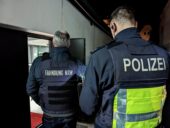Intelligence service coordinators from 15 European countries are organising themselves in a new group, known as “G15”. Initial meetings have been held in Berlin and Rome. The attendees were meant to remain anonymous – but one of them has broken cover.
Rather unexpectedly, a number of European governments have initiated moves to set up yet another intelligence network, whose remit will go beyond cooperation among national agencies and is likely to involve foreign intelligence services as well. Early this year, the intelligence service coordinators from 15 countries formed the Paris Group, known in some publications as “G15”.
The German Government describes the group as a “discussion format” in response to the terror attacks “on European soil”. Germany’s representative is Klaus-Dieter Fritsche, Federal Intelligence Service coordinator at the Federal Chancellery. It is not known where the Paris Group first met; however, in May, the members convened – probably for the second time – in Berlin. The meeting was organised and chaired by Fritsche. Peter Altmaier, Head of the Federal Chancellery and Federal Minister for Special Tasks, gave the opening speech. A follow-up October meeting in Rome was organised by the Italian intelligence service coordinator.
Member countries now identified
The meetings do not only involve the group: representatives of other “European institutions” or “multilateral forums” may also be invited. In Rome and Berlin, this meant participants from INTCEN and the CTG as the existing European structures for the national agencies. The EU’s Counter-Terrorism Coordinator, Gilles de Kerchove, was also in attendance.
Other details of the Paris Group are kept under wraps: they are subject to the “third-party rule”, which even applies to the members themselves. It seems that not everyone invited to the clandestine gatherings is aware of this: Statewatch, a British NGO which monitors the state and civil liberties, has published a document listing the anti-terrorism coordinators of most of the members: Austria, Belgium, Denmark, France, Germany, Ireland, Italy, Netherlands, Norway, Poland, Spain, Sweden and the UK.
The EU has no mandate to coordinate the intelligence services
As the European Union has no mandate to coordinate its members’ intelligence services, representatives of the intelligence agencies of the EU member states plus Norway and Switzerland meet in an informal framework. The oldest group of this type is the Club de Berne, an information-sharing forum involving the heads of the various national intelligence agencies.
After 9/11, the Club de Berne set up the Counter Terrorism Group (CTG), in which members regularly review developments and discuss anti-terrorism plans. On 1 July 2016, the Club de Berne and its CTG launched an “operative platform” in The Hague, with a shared database and real-time information system. No details have been released. There are now plans to link the CTG with EU police structures: the European Commission is proposing to set up a European “fusion centre” with the law enforcement agencies.
Despite having no competences for this field, the European Union operates a civilian Intelligence Analysis Centre (EU INTCEN) in Brussels, to which domestic and foreign agencies can submit their completed analyses. With no powers to collect or process raw data, INTCEN is seen as ineffectual. An equivalent structure – the EUMS INT Directorate – is in place as the “intelligence division of the EU military staff”.
Image: CC-0 Moritz Schmidt




